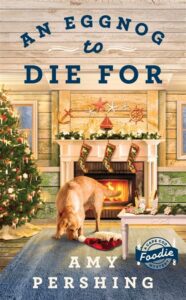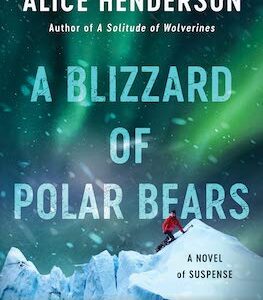Given the enduring passion of the reading public for Christmas murder mysteries, I am prompted to ask, What is it about Christmas and crime? It can’t just be the alliteration (although I love me some good alliteration, as will become obvious as you read on). No, I’m convinced it has something to do with that moment we’ve all had at least once when, at a holiday gathering, you think, “I wish someone would put us out of our misery and just kill Great-Uncle Albert/Cousin Bertha/[insert family member’s name here].” What? You’ve never felt that way? Well, then, this essay isn’t for you. But for the rest of us normal people, there is something wonderfully satisfying about a book in which Great-Uncle Albert or Cousin Bertha (or better still, both) receive the unexpected Christmas present they so richly deserve.
In my Christmas murder mystery, An Eggnog to Die For, I go it one better and actually kill off Santa Claus himself. No, not that Santa Claus. I would never kill off that Santa Claus. I kill off a thoroughly unpleasant fellow playing Santa Claus in a small town’s “Santa Selebration.” And, believe me, the fellow richly deserved it. Of course, in the grand tradition of Santa slayings, how it’s done and by whom is brilliantly twisty, she says modestly. And so I’ve contributed my bit to the grand tradition of holiday homicide.
If you happen to be new to this grand tradition—because you’ve been living under a reading rock somewhere—I’ve pulled together a highly subjective list of ten terrific Christmas murder mysteries, some light and frothy (like a good eggnog), some rather grim (as in the Reaper), some classic (English manor house, etc., etc.) and some modern (sex! swearing!). But all are stylish, well written and cleverly plotted and, above all, chock full Christmas chaos.
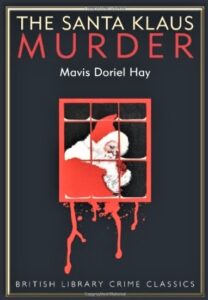
The Santa Klaus Murder by Mavis Doriel Hay
“One felt that there must be something wrong with a man who had such a perfect profile and such unnaturally natural waves in his crisp fair hair.”
Originally published in 1936, Mavis Doriel Hay’s The Santa Klaus Murder is generally regarded as the blueprint for the zillions (at a rough estimate) of English manor house Yuletide murder mysteries to follow. It has all the elements—a family gathering at the ancestral home; a universally disliked and quickly dispatched family patriarch; multiple suspects hiding multiple secrets; and a dogged investigator trying to make sense of it all. But what really makes this Golden Age mystery unique is the author’s unusual choice to include multiple perspectives as each suspect writes his or her statement.
In this very cleverly plotted mystery (which includes that lovely old-fashioned reader’s aid, the detailed floor plan), a guest dressed as Santa Claus (or Klaus, if you prefer) finds family patriarch Sir Osmond Melbury on Christmas Day with a bullet in his head. As usual there is no dearth of suspects, but their motivations are a bit more difficult to winkle out.
Verdict: A fun read and a classic of the genre.
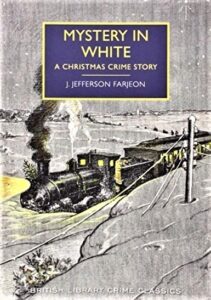
Mystery in White: A Christmas Crime Story by J. Jefferson Farjeon
“The horror on the train, great though it may turn out to be, will not compare with the horror that exists here, in this house.”
A mere two years later, in 1938, J. Jefferson Farjeon, whom Dorothy Sayers called “unsurpassed for creepy skill in mysterious adventures,” turned the Christmas mystery on its head with Mystery in White: A Christmas Crime Story, which when it was rereleased by British Library Crime Classics in 2014, became an unexpected bestseller.
On Christmas Eve, heavy snowfall brings a train to a halt near the village of Hemmersby. Several passengers take shelter in a deserted country house, where the fire has been lit and the table laid for tea—but there’s nobody to be found in the house. Trapped together for Christmas, the passengers begin unravelling the secrets of the empty house when a murderer strikes in their midst. Unsettling may be the best word to describe Mystery in White, but it’s also a very workmanlike mystery, with clues deftly scattered for the discerning reader.
Verdict: Never has the word “chilling” been so apt.
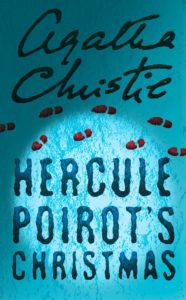
Hercule Poirot’s Christmas by Agatha Christie
“You yearned for a ‘good violent murder with lots of blood.’ So this is your special story—written for you.” – Agatha Christie, from the dedication
Why Agatha Christie chose a Christmas mystery to defuse her critics’ claim that her murders were getting too refined is a question probably best left unexplored. And never fear, despite the gory demise of the nasty family patriarch, there is, as the Times Literary Supplement put it, “an irresistible simplicity and buoyancy of a Christmas treat about it all.’
It is Christmas Eve. The Lee family reunion is shattered by a deafening crash of furniture, followed by a high-pitched wailing scream. Upstairs, the tyrannical Simeon Lee lies dead in a pool of blood, his throat slashed. But when Poirot, staying in the village with a friend for Christmas, offers to assist, he finds that many of those in the house had their own reason to hate the old man…
This is one of Christie’s more intricately plotted novels, and though some complain that she broke one of the cardinal rules of mystery writing, I stand with The Observer’s reviewer, who famously said, “the rules were not made for Agatha Christie.”
Verdict: One of Christie’s best, broken rule and all.
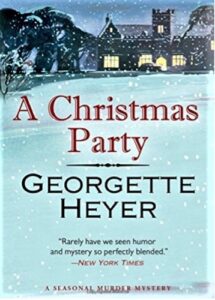
A Christmas Party: A Seasonal Murder Mystery by Georgette Heyer
“Nathaniel, regarding him with a contemptuous eye, said that a real English Christmas meant, in his experience, a series of quarrels between inimical persons bound to one another only by the accident of relationship, and thrown together by a worn-out convention which decreed that at Christmas families should forgather.”
And there you have it, Christmas in a nutshell.
As always with Georgette Heyer (more well known for her Regency romances but also a hugely talented mystery writer), there is something remarkably contemporary and witty about her novels, even one published in 1941 and bound by the conventions of Christmas at a country house, and the death of an old Scrooge.
In A Christmas Party (originally published as Envious Casca), six holiday guests find themselves the suspects in a murder inquiry when the old miser who owns the estate is found stabbed in the back. And though the ostensible conundrum is a locked room mystery, I am inclined to wonder why Nathaniel didn’t murder at least one or two of his thoroughly unpleasant family members rather than the other way around.
Verdict: A sophisticated romp.
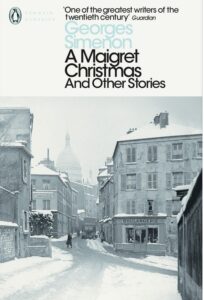
A Maigret Christmas: And Other Stories by Georges Simenon
“I saw him.”
“Who did you see?”
“Father Christmas.”
“When did you see him? Where?”
“Here, last night. He came into my room.”
Depending on the edition, this collection, first published in 1951, brings together seven or three of Georges Simenon’s Christmas tales. But all contain the lead story, “A Maigret Christmas,” in which a sensible little girl insists to her neighbor, Inspector Jules Maigret, that she has been visited by Father Christmas himself. And Inspector Maigret is not one to argue. After all, how else is one to explain the doll left for the child by her mysterious visitor? How else, indeed…
This superb story, made all the more poignant by the sadness that the season brings to the childless Madame Maigret, is also a supremely evocative depiction of impoverished, but still ever so French, post-war Paris.
Verdict: Superb. Not to be missed.
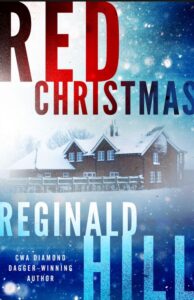
Red Christmas by Reginald Hill
“I’m not going to be shot in a wheelbarrow, for the sake of appearances, to pleases anybody.” Mr. Samuel Pickwick
In this Dickens-inspired whodunit (which includes lovely chapter-headings from Dickens himself), the author of the Dalziel and Pascoe mysteries, Reginald Hill, takes us to Dingley Dell, a secluded hotel in the English countryside where the guests have been promised a “Dickensian Christmas.”
In this stand-alone novel, Miss Arabella Allen, “possessed of all the knowing cynicism of a twenty-three-year-old English virgin,” (it’s 1972, people) finds herself snowbound with a rather odd assortment of fellow hotel guests—and a frozen corpse. As the temperatures drop and the body count rises, the clever and resourceful Arabella takes it upon herself to investigate this increasingly deadly silent night.
Verdict: A thrilling (spies!) “Dickensian” mystery.
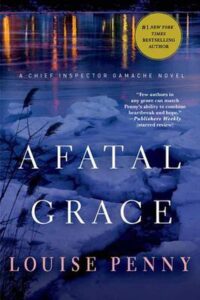
A Fatal Grace by Louise Penny
“Had CC de Poitiers known she was going to be murdered she might have bought her husband, Richard, a Christmas gift.”
And with this opening line, Louise Penny, author of the fabulous Chief Inspector Gamache mysteries, informs the reader that even though we are in the magical (and perhaps even mystical) Canadian town of Three Pines, there is still a gritty reality to be faced, even at Christmas time.
No one liked CC de Poitiers—not her family, not her lover, not her neighbors in Three Pines. Still, when Chief Inspector Armand Gamache is called upon to investigate CC’s sudden death on the day after Christmas, it seems impossible: how could she have been electrocuted in the midst of Three Pines’ annual curling match? (a curling match!) As Gamache digs for secrets beneath the surface of village life, it becomes clear that something even more chilling approaches.
Verdict: A masterful work by a contemporary master of the genre.
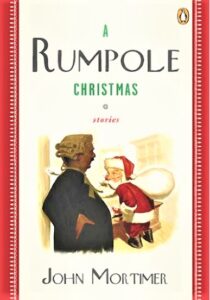
A Rumpole Christmas by John Mortimer
“Christmas had come again. There was tinsel and a few battered Christmas cards in the screws’ room near the cells under the Old Bailey and you couldn’t call on a tobacconist’s for a packet of small cigars without being treated to a canned rendering of God Rest Ye Merry Gentlemen…”
Who doesn’t miss the redoubtable barrister Horace Rumpole? I mean, I even miss She Who Must Be Obeyed (aka the formidable Hilda Rumpole). So there was much rejoicing when, in 2009, Penguin Books brought John Mortimer’s legions of fans this first-ever collection of Rumpole holiday stories.
And what a lovely collection it is—full of Mortimer’s dry wit and keen eye for hypocrisy and just plain old human foolishness. And of course we have the curmudgeonly Rumpole himself, dedicated (between musing on life over a glass of Pommeroy’s Very Ordinary) to justice for his sometimes dodgy but always entertaining clients.
Verdict: The perfect stocking stuffer!
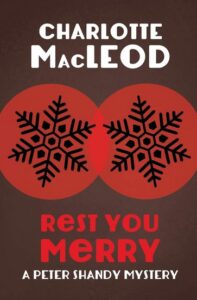
Rest You Merry by Charlotte MacLeod
“Altogether too many of Shandy’s Christmases had been blighted by the overwhelming holiday spirit around the Crescent….He alone, like a balding King Canute, stood steadfast against the tide.”
Charlotte MacLeod’s wonderful cozy mysteries featuring irascible Professor of Botany Peter Shandy are at once charming and shrewd. Rest You Merry is no exception.
Every December the faculty of Balaclava Agricultural College (don’t you love it?) goes wild with holiday decorations. For the college, Christmas is big business, and the town needs the cash infusion that comes with the Illumination. For years Peter Shandy has stubbornly refused to be a part of “the Annual Fleecing.” But this year he snaps and installs a display of flashing lights and blaring music calculated to drive his neighbors mad. He then flees town, only to return home and find his lights extinguished—and a dead librarian in his living room.
Verdict: Cleverly plotted and refreshingly caustic.

“The Murder of Santa Claus” from the short story collection Sleep No More by PD James
“If you’re an addict of detective fiction, you may have heard of me, Charles Mickledore. I say addict advisably; no occasional or highly discriminating reader of the genre is likely to ask for my latest offering at his public library. I’m no H. R. F. Keating, no Dick Francis, not even a P. D. James.”
So begins “The Murder of Santa Claus” by, ahem, P.D. James, the first of six darkly humorous Christmas tales from the master in the collection Sleep No More. The longest is “The Murder of Santa Claus,” told in the first-person by two very different narrators: the sixty-year-old, third rate-mystery writer Charles Mickledore, who gives his version of what happened in 1939 when he was a sixteen-year-old staying at his uncle Victor’s country house over the Christmas break, and the seventy-six-year-old retired police officer, John Pottinger, for whom the murder at the manor was his first case. Unsurprisingly, their stories don’t always jibe. But don’t stop with “The Murder of Santa Claus.” All of the stories in this collection are remarkable examples of James’s graceful writing and sheer intelligence.
Verdict: It doesn’t get any better than this.
***


